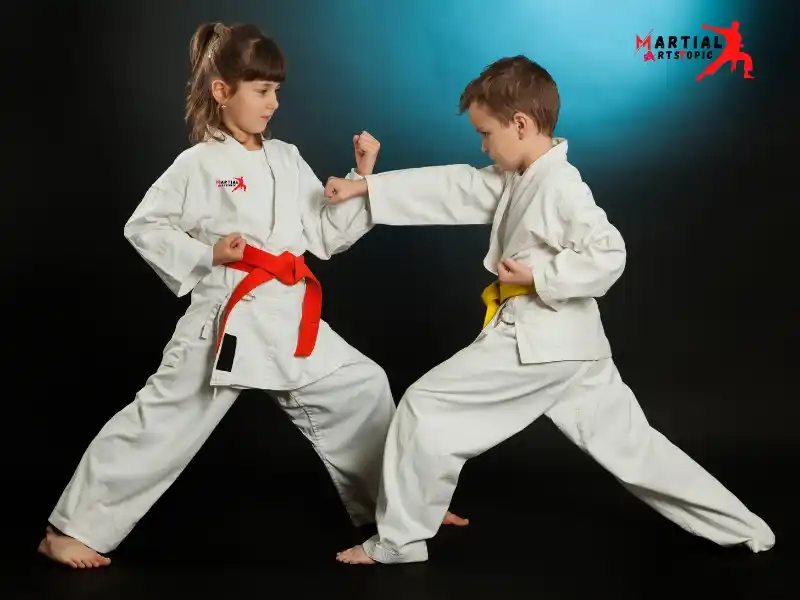
The Incredible Benefits of Practicing Karate
Practicing karate offers a wide range of incredible benefits for both the body and mind. One of the key benefits of karate is its ability to improve physical fitness, as it involves intense movements that enhance strength, flexibility, and cardiovascular health. Moreover, engaging in karate can also significantly boost mental well-being by reducing stress and anxiety levels through the practice of focused breathing and mindfulness. Additionally, learning karate instills discipline, self-control, and confidence in individuals, promoting personal growth and character development. Furthermore, it serves as an effective self-defense mechanism, equipping practitioners with essential skills to protect themselves if necessary. Overall, the holistic advantages of practicing karate make it a rewarding and empowering martial art to pursue for people of all ages.
Physical Fitness and Health Benefits of Karate
Karate offers an array of physical fitness and health benefits. Engaging in karate training enhances cardiovascular health, stamina, flexibility, and strength. The practice of this martial art also promotes weight loss and muscle toning. Additionally, karate serves as an effective form of stress relief and helps to improve mental focus and concentration. As a result, individuals who practice karate experience not only physical fitness improvements but also enhanced mental well-being. Moreover, the discipline and self-control fostered by karate training can positively impact overall health. These combined benefits make karate a holistic approach to enhancing both physical fitness and overall well-being. If you’re looking for a comprehensive way to improve your health, consider incorporating karate into your fitness routine for these numerous advantages.
- Cardiovascular Health: Engaging in regular karate training is an excellent way to boost cardiovascular fitness. The dynamic movements, kicks, punches, and blocks involved in karate routines elevate the heart rate, leading to improved circulation and a healthier heart.
- Strength and Muscle Tone: Karate involves various forms of striking, kicking, and stance work that can significantly enhance muscle strength and tone. Through consistent practice, individuals can develop stronger and more defined muscles throughout their entire body.
- Flexibility and Balance: Karate training places a strong emphasis on flexibility and balance. Practicing katas (choreographed patterns of movements) and performing various stances help improve overall flexibility, agility, and balance, which are essential for preventing injuries and maintaining mobility as you age.
- Weight Management: As an intensive full-body workout, karate training can aid in weight management by burning calories and increasing metabolism. Combined with a balanced diet, regular karate practice can assist individuals in achieving their weight loss or maintenance goals.
- Self-Confidence and Discipline: Karate instills valuable life skills such as self-discipline, focus, respect for others, perseverance, and confidence. These attributes cultivated through martial arts training can positively affect various aspects of one’s life beyond the dojo.
- Mental Sharpness: The mental challenges presented in learning new techniques, memorizing katas, and sparring exercises contribute to improved cognitive function. Regularly engaging in these activities may help enhance memory retention, concentration levels, and overall mental acuity.
- Social Interaction: Joining a karate class provides an opportunity for social interaction with like-minded individuals who share a passion for martial arts. Building connections with fellow practitioners can contribute to a sense of community and belonging.
Mental and Emotional Well-being
Maintaining good mental and emotional well-being is crucial for overall health, and engaging in activities like karate can offer numerous benefits. Karate provides an effective outlet for stress relief and helps to improve mental focus and discipline. The practice of karate also promotes self-confidence, resilience, and a sense of achievement, which are all essential for emotional well-being. Additionally, the physical activity involved in karate training releases endorphins, which can elevate mood and reduce symptoms of anxiety and depression. By incorporating karate into a wellness routine, individuals can experience the holistic benefits that positively affect their mental and emotional state.
- Stress Reduction:Engaging in karate training provides an outlet for releasing pent-up stress and tension. The focus required during training helps individuals to clear their minds of external stressors, promoting a sense of calmness and inner peace.
- Increased Confidence: Karate empowers individuals by teaching them self-discipline, perseverance, and confidence. Through regular practice, participants develop a strong sense of self-assurance, which positively affects their emotional well-being.
- Emotional Regulation: The practice of karate involves learning how to control movements, breathing, and emotions. This fosters better emotional regulation and equips individuals with valuable skills to manage their feelings effectively.
- Mindfulness and Focus: Karate training emphasizes the importance of being present in the moment, fostering mindfulness and improved concentration. This heightened focus can have a positive impact on one’s mental clarity and cognitive function.
- Sense of Community: Participating in a karate class cultivates a sense of belonging to a community with shared goals and values. This social support network can significantly contribute to improved mental well-being through increased social interaction and camaraderie.
- Stress Relief through Physical Activity: Regular physical exercise is known to be beneficial for mental health by reducing stress hormones such as cortisol while triggering the release of endorphins – the body’s natural mood elevators.
- Self-awareness and Emotional Expression: Karate encourages practitioners to become more attuned to their bodies, thoughts, and emotions, enabling them to express themselves in healthy ways while fostering self-awareness.
- Resilience Building: The discipline required in karate training promotes resilience against life’s challenges by instilling determination, perseverance, adaptability, and grit – all essential components of good mental health.
Self-Defense Skills
Learning self-defense skills such as karate can offer a multitude of benefits. Not only does it provide individuals with the knowledge and ability to protect themselves in potentially dangerous situations, but it also promotes physical fitness, mental discipline, and self-confidence. Karate training involves rigorous physical activity that improves strength, flexibility, and overall health. Additionally, the mental focus and discipline required in learning karate can positively affect one’s concentration and self-control in various aspects of life. By mastering self-defense techniques through karate practice, individuals not only enhance their personal safety but also experience holistic development that extends beyond physical prowess.
- Physical Fitness: One of the most apparent advantages of practicing karate is improved physical fitness. Through a combination of dynamic movements, strikes, and stances, practitioners develop strength, agility, flexibility, and cardiovascular endurance. This full-body workout not only enhances overall health but also contributes to weight management and muscle toning.
- Self-Defense Proficiency: Karate equips individuals with practical self-defense techniques that can be invaluable in real-life situations. By mastering striking, blocking, and grappling maneuvers, practitioners gain confidence in their ability to protect themselves and others if necessary.
- Mental Resilience: Beyond physical prowess, karate fosters mental resilience and discipline. Practitioners learn to focus their minds, cultivate patience, and remain calm under pressure. These attributes are not only beneficial in self-defense scenarios but also in everyday life challenges.
- Self-Confidence Boost: As practitioners progress in their karate journey, they experience a significant boost in self-confidence. Mastering new techniques, surpassing personal limits, and earning higher belt ranks instill a sense of achievement and self-belief that transcends beyond the dojo.
- Enhanced Coordination and Reflexes: Karate drills improve coordination between the mind and body while honing reflexes for swift responses to external stimuli—a valuable asset for self-defense scenarios or any physical activity.
- Character Development: Karate places strong emphasis on respect, humility, perseverance, integrity, and other core values known as “dojos.” These principles shape practitioners into well-rounded individuals with a deep sense of honor and ethics.
- Social Connection: Joining a karate community fosters social interaction among like-minded individuals who share a passion for martial arts. This sense of belonging can lead to lasting friendships and a supportive network.
- Lifelong Learning Journey: Karate is not just a skill; it’s a lifelong journey of continuous improvement both physically and mentally. The pursuit of mastery keeps practitioners engaged and motivated to strive for excellence in all aspects of their lives.
Character Development
Character development through karate offers numerous benefits that extend beyond physical fitness. Engaging in karate training cultivates discipline, focus, and perseverance, which are essential qualities for personal growth and development. Through the practice of karate, individuals can improve their self-confidence, self-discipline, and respect for others. Additionally, the structured nature of karate training encourages participants to set and achieve goals, fostering a sense of accomplishment and empowerment. These holistic benefits contribute to the overall character development of individuals, shaping them into well-rounded and resilient individuals both on and off the mat.
- Self-Discipline: Karate places a strong emphasis on self-discipline, teaching practitioners to adhere to strict training regimens and uphold a code of conduct both inside and outside the dojo. Through consistent practice, individuals learn the value of perseverance, self-control, and dedication – all essential components of a disciplined character.
- Confidence Building: As practitioners progress in their karate journey, they gain confidence in their abilities and strengths. Mastering new techniques and overcoming challenges instills a sense of self-assurance that transcends into other aspects of life. This newfound confidence can have a transformative effect on an individual’s overall character.
- Respect and Humility: Central to the philosophy of karate is the cultivation of respect for oneself and others. Practitioners are taught to honor their instructors, peers, and opponents while remaining humble in their achievements. These values mold individuals with a deep sense of respectfulness and humility.
- Focus and Concentration: The intense mental concentration required during karate practices not only sharpens physical reflexes but also enhances cognitive abilities. This heightened focus extends beyond the dojo, enabling practitioners to approach tasks with unwavering concentration – a valuable trait for personal growth and success.
- Stress Management: Engaging in karate offers an outlet for releasing pent-up stress and tension. Through rigorous training sessions and controlled breathing techniques, individuals develop resilience against everyday stressors, ultimately fostering emotional stability and fortitude.
- Goal Setting and Achievement: Setting goals is an integral part of karate training as practitioners work towards mastering new forms or advancing through belt ranks. This process instills an appreciation for goal setting, perseverance, and the satisfaction derived from achieving personal milestones.
- Conflict Resolution Skills: Karate teaches individuals how to handle conflicts with composure and control – whether it be within sparring matches or navigating interpersonal challenges off the mat. Learning how to manage conflicts peacefully contributes to the development of strong communication skills and emotional intelligence.
Conclusion
Benefits of Karate: The benefits of practicing karate are wide-ranging and impactful. From physical fitness and self-defense skills to mental discipline and self-confidence, karate offers numerous advantages for people of all ages. The practice of karate not only improves strength, flexibility, and coordination but also promotes focus, determination, and respect. Additionally, the sense of community and camaraderie found in karate classes can foster a supportive and encouraging environment for personal growth. Overall, the holistic nature of karate makes it a valuable pursuit that can positively influence various aspects of one’s life. Whether it’s for fitness, personal development, or self-defense, the benefits of karate make it a rewarding martial art for individuals seeking both physical and mental enrichment.
